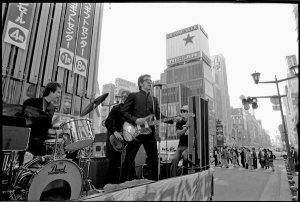Elvis Costello is one of the most gifted lyricists of our time. His prolific run of albums between 1977 and 1983 rank among the most memorable song collections in music history.
With the passing of one of Costello’s many collaborators, Allen Toussaint on November 10, I thought it was worth tossing in my two cents on Costello’s masterful memoir Unfaithful Music & Disappearing Ink.
Here are ten points on the book. Much more in depth reviews are available elsewhere.
- Buy the audiobook. It is narrated by Mr. Declan McManus himself. He alternates between his Liverpudlian lilt and west London twang as the story requires. He is animated and brings the fantastic prose to life.
- The book is at its best when Costello discusses the inspirations for his songs. The studio crafting of Imperial Bedroom is particularly mesmerizing.
- The book is not totally chronological. This adds a unique series of tangled webs throughout the book that is far more colorful than a straight passage through time.
- McManus’ father Ross is an ever-present character. His long career as a performer in the Joe Loss Band exposed young Declan to the rigors of show-business and the glories of performance. The grind-it-out schedule and his frequent absence are sources of pain for both father and son alike.
- Like me, Costello needed an editor. I will admit that I didn’t finish the book which clocks in at over 600 pages. His relationships with Paul McCartney, Bob Dylan, Burt Bacharach, George Jones, among others, are interesting but these chronicles eventually become tedious. Costello’s encyclopedic knowledge of music is, however, incredible.

- Britain in the Thatcher era is on full display. The miner’s strikes, the hopelessness of youth, the sense that one can’t rise above a working class level are palpable. If anything, Costello downplays his own rise from country western pubs to American tours and record deals. He worked hard.
- The Attractions get short shrift. The relationship is strained between the quartet, but we never really get to the core issues. Steve Nieve, Bruce Thomas and Pete Thomas are genius musicians and they deserved far more attention.

- Costello gets off a little easy when he talks about his failed relationships. His allusions to affairs and bad behavior are not explicit enough for a true memoir.
- His explanation of his most controversial moment: alleged racist comments made in a Columbus, Ohio bar during 1979 about black music luminaries such as Ray Charles gets an impassioned defense, but it feels like he performs an escape act rather than uncovering a full character analysis. In Costello’s defense, this topic has been Beaten to the Punch like a King Horse over decades. Its been so debated and discussed that it really is last Year’s Model. There is no question that Costello more than made up for his possible transgression: The influence of R&B is significant throughout his catalog.
- Did we really need all that Brodsky Quartet information? Snooze.

Anyone who appreciates Costello at his peak, knows that his true gift to the music world was (is?) the ability to wrap up biting sarcasm and satire in the sweet and sugary beauty of a pop hook (just listen to Get Happy and you’ll find 20 songs that hit on all Five Gears – not in reverse). Unfaithful Music delivers the background for these awesome songs. The Beatles loom larger than expected (and why wouldn’t they?). The bitterness of politics (Radio Radio, Oliver’s Army) and misguided relationships (The Long Honeymoon, Man Out of Time) are laid bare in these pages.
